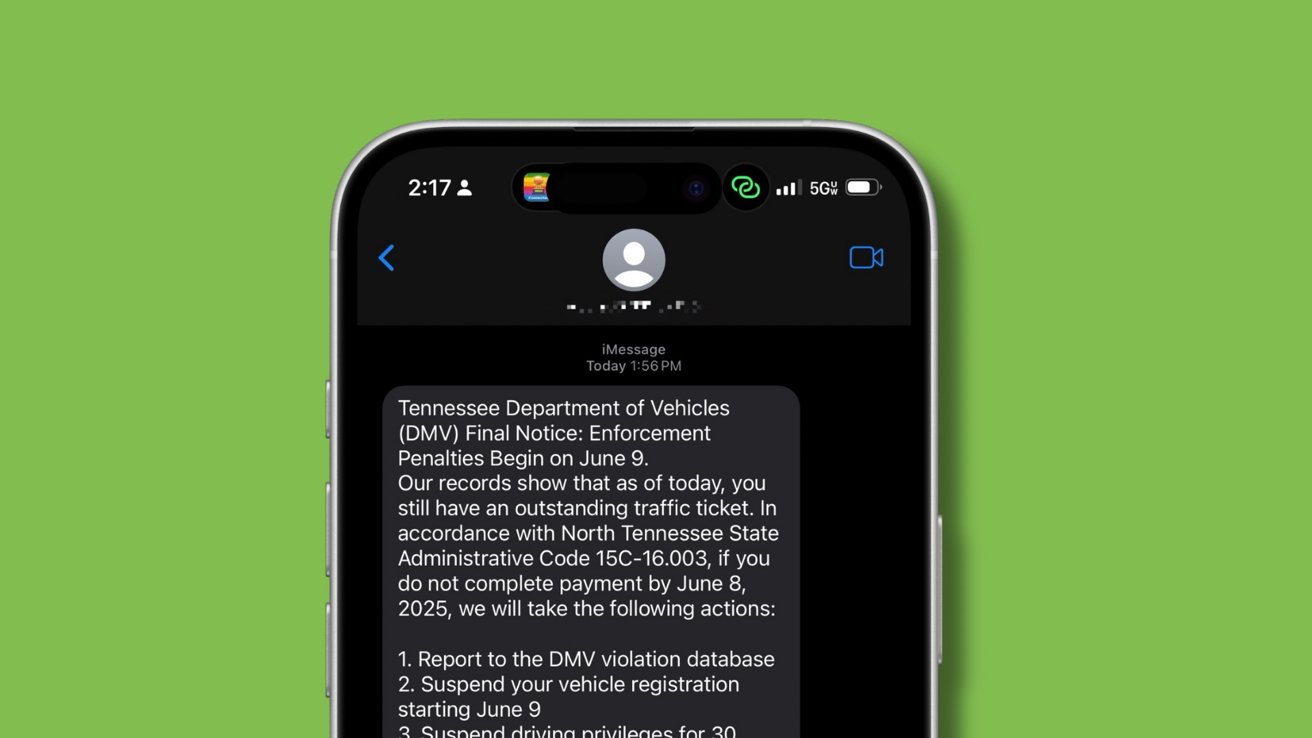iPhone users are getting hit with scam texts
Cybercriminals are using fake DMV texts and cheap tricks to phish iPhone users ahead of a made-up June deadline.
Mobile users all over the U.S. face a new scam text wave from fake government authorities. A recent message that one of our staffers got from the “Tennessee Department of Vehicles” warns of an overdue traffic ticket, legal action, license suspension, and credit score damage if payment isn’t made by June 8.
The text includes a link to a fake government payment site and urges victims to reply with the letter “Y” to activate the link. Links aren’t tappable if the text is from an unknown sender. If you reply with that “Y,” the message it automatically becomes from a “known” sender, which makes the link tappable
But, all of the messages are textbook examples of phishing scams.
These messages aren’t limited to Tennessee. Similar scam texts have been reported in Texas, Virginia, and Pennsylvania using slightly different wording and fake agency names. In each case, the scammer pretends to be a government authority, threatens legal consequences, and includes a fraudulent payment link.
The variation in wording means that this is a nationwide campaign that adapts to make the message sound local and convincing.
How the scam works
The message in question references a made-up “North Tennessee State Administrative Code” and mimics official language to appear legitimate. But there are clear red flags.
The main one is that the link “tn.gov-hjpp.life/pay” is a spoofed domain unrelated to any official government service. And, the message comes from a foreign phone number, starting with the country code +63, which corresponds to the Philippines.
This specific style of scam follows a national pattern. As AppleInsider reported in March, highway toll and ticket scams are on the rise nationwide. Criminals are using more than 60,000 registered fake domains to trick users into giving up credit card information.
The FBI has received over 2,000 complaints in a single month related to these fake unpaid toll messages, prompting federal warnings to avoid clicking any links in such texts.
Scammers intentionally keep the supposed “fine” low, usually just a few dollars, to make it seem easier to pay than to verify. But the goal is to steal payment information and reuse it later for more serious fraud.
Why the scam is spreading
These texts are cheap and easy to send at scale. Criminal groups, believed to include networks operating from China, use low-cost mass texting platforms and bulk phone number purchases to blast millions of devices.
The return on investment can be significant if even a small percentage of recipients respond.
Apple has introduced safeguards like removing clickable links in Messages from unknown senders. But many scams now instruct users to “reply Y” and reopen the message which allows users to click the link.
Even savvy users can fall for the trick. Sometimes, the timing of the scam often aligns with recent travel, which adds a false sense of plausibility.
How to spot and respond to scam texts
If you get a suspicious message claiming you owe a traffic fine or toll, the most important thing is to avoid interacting with it. Don’t click any links or reply to the text, even with something as simple as “Y.”
That kind of response can confirm your number is active and open the door to further targeting. Instead, block the sender and report the message. Apple iPhone users can tap “Report Junk” directly in the Messages app to help flag the scam.
If you’re uncertain whether the notice is legitimate, go directly to official sources like tn.gov rather than trusting any link in a message. The FBI also encourages anyone who receives a scam text to file a complaint with the Internet Crime Complaint Center at ic3.gov.
After that, you can safely delete the message.
Scam texts often share certain characteristics. Many impersonate nonexistent agencies, like a so-called “Department of Vehicles,” and use domain names that appear official but include suspicious extras.
These suspicious components can be unfamiliar suffixes like “.life” or hyphenated versions of real government URLs. Other red flags include messages from foreign numbers, vague legal threats, or demands for immediate payment to avoid license suspension or credit score damage.
These scams rely on urgency to create panic, but they fall apart under scrutiny. Taking a moment to double-check before clicking can help you avoid handing over personal information to criminals.







